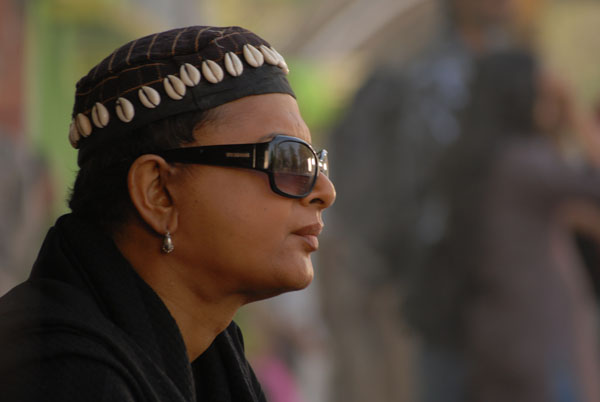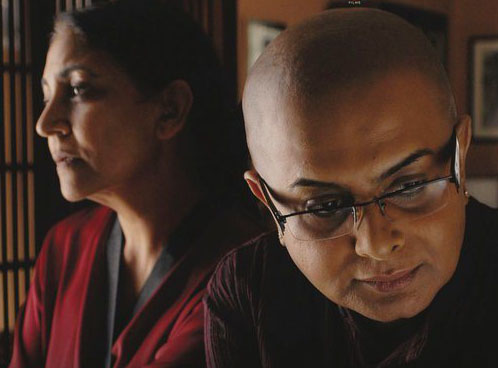On Tuesday, multiple award-winning Indian filmmaker Rituparno Ghosh tweeted, “Wrapped up the shoot of Satyanewshi, a crime thriller in the molten glow of the pensive falling afternoon.” This morning, Ghosh suffered a massive heart attack and died in Kolkata, aged 49. As the AP and BBC are reporting, the tributes are pouring in.
“Shekhar Kapur, director of the 1998 Academy Award-winning period film Elizabeth, tweeted that he was “shocked by the passing of Rituparno Ghosh.’ He described Ghosh as a ‘hugely creative explorer on film.’ Indian character actress Kiran Kher said Ghosh was a marvelous director and that his death was a ‘huge loss for Indian cinema.'”
“‘I cannot believe that Rituparno is no more. It is very difficult to accept this news. We lost a very promising film director at a very early age,’ the Press Trust of India quoted veteran actor Soumitra Chatterjee as saying. ‘Rituparno Ghosh had great sense of humor. He had a brilliant understanding of human behavior. Will miss him and his cinema. RIP my Friend,’ wrote Bollywood actor Anupam Kher. Noted film critic Rajeev Masand tweeted: ‘Deeply saddened by passing of Rituparno Ghosh. He understood the human condition with all its complexities and conveyed them with such sensitivity.'”
The BBC also notes that Ghosh had “worked with several big stars of Bengali cinema and Bollywood stars like Amitabh Bachchan and Aishwarya Rai. Mr. Ghosh also acted in some of his films, including in Aar Ekti Premer Golpo (Just Another Love Story) and Chitrangada. His 2003 film Chokher Bali was awarded the Golden Leopard at the Locarno Film Festival and his last film, Chitrangada, won a special jury award in the 2012 national film awards.”
BBC correspondent Amitabha Bhattasali notes that Ghosh “loved dressing as a woman—his sexuality made him stand out from the crowd in largely conservative India. Initially he wore men’s clothes, but in the last few years he completely switched over to women’s dresses. Film analysts say that through his films, writings and acting roles, Mr. Ghosh gave a voice to disempowered sexual minorities.”
The Indian Express looks back on the life and work in an annotated photo gallery: “He veered into filmmaking from a successful career in advertising, bursting into the scene with Heerer Angti (The Diamond Ring) in 1992, which explored a man’s failed attempt to ingratiate himself into the graces of a prosperous household to get hold of the property. In 1994, came Unishe April (19th of April), a pathbreaking movie in Bengal, exploring the relationship between a mother and a daughter.” The film’s a loose adaptation of Bergman’s Autumn Sonata. “Though probing and disturbing the social fabric was his forte, Rituparno Ghosh has also drawn inspiration from giant literary works like that of Rabindranath Tagore’s Chokher Bali, not shying away from interpreting social problems of another era.” In Kaushik Ganguly’s Arekti Prem-er Golpo, “Ghosh played a transgender filmmaker, shooting a biopic on the first self-evident gay jatra actor of Bengal, Chapal Bhaduri. Chapal Bhaduri was also known as Chapal Rani for his portrayal of feminine roles, at a time when women were not allowed on stage. Ghosh’s own sexual orientation also gets full play in his portrayal of the gay director.”
Update, 5/31: “Even in the relatively brief period in which he was active, Ghosh was integral in expanding the cinematic language and visibility of underrepresented groups in Indian cinema, both in regional and Hindi films,” writes J. Hurtado at Twitch. “In twenty years Ghosh directed 20 features, beginning with dramatic interpretations of working class life in Calcutta, moving through higher profile films with big name Bollywood actors, and finally settling into a series of films addressing the challenges of the LGBTQ and other minority communities in a rapidly evolving India…. I reached out to fellow Bengali filmmaker, iconoclast, and friend of Twitch, Q, to get his reaction to Ghosh’s passing, this is what he had to say: ‘I got to meet him couple of times, and once had a decent conversation. My regard for him grew as I began to appreciate how he had kept the flag flying for something other than trash aesthetics of commercial Bengali cinema. His coming out was his ‘fuck you’ to his, and my, society, and I loved the way he did it.'”
For news and tips throughout the day every day, follow @KeyframeDaily on Twitter and/or the RSS feed. Get Keyframe Daily in your inbox by signing in at fandor.com/daily.





